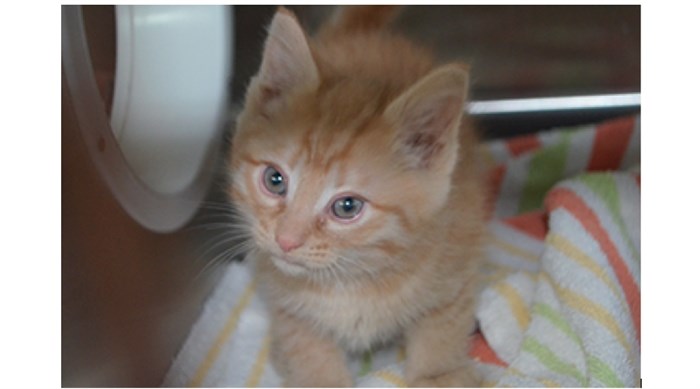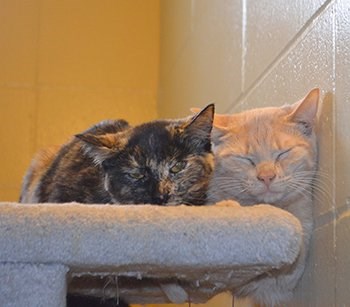
After the seizure, the neglected kittens were taken to veterinarians and the adult cats were taken to BC SPCA locations for assessment.
Image Credit: SUBMITTED/BC SPCA
May 24, 2017 - 1:49 PM
KAMLOOPS – Fifty-nine cats were rescued from a man living in Chase and less than five months ago, the very same man had 31 cats seized in Kamloops.
B.C. SPCA animal welfare officers are recommending charges of animal cruelty after they rescued the 59 neglected cats living in an outdoor travel trailer and camper in Chase on May 14.
Kamloops bylaw officers took the animals from the same man in December 2016 because of a local bylaw that outlines a limit of two cats per household. At the time, there were no signs of neglect or illness in the animals, so the SPCA was not involved in the case, aside from boarding the animals after the seizure.
But when the man moved to Chase the cats were returned. There is no bylaw in Chase that restricts the number of cats a person can own.
Five months later, SPCA animal protection officers moved in and seized the distressed cats, senior animal protection officer Kathy Woodward says.
The investigation is ongoing, so the exact details of the case aren't being released to the public. However, Woodward did explain that distress could mean a number of poor conditions including inadequate food, water, space, ventilation, or veterinary care.
Woodward says the SPCA is pushing for animal cruelty charges against the owner.

The seized cats are currently in the care of the B.C. SPCA.
Image Credit: SUBMITTED/B.C. SPCA
“He could face a substantial fine. He could face jail time. Most important to us is that we will be seeking a prohibition from him owning animals so this does not and cannot happen again,” she says.
Animal protection officers can attend a property after a complaint or concern is received from the public, and then issue a notice that outlines what the owner must do to fix the situation.
In this case, officers returned to check if the owner followed the order. They obtained a warrant and seized the animals.
The man has 14 days after the seizure to apply to have the animals returned to him. Woodward says there are many issues he’d have to fix to get them back.
“This person was incapable of caring for the animals he had. The animals were in distress,” she says.
Kent Kokoska, senior animal protection officer, made initial contact with the man and his cats when he was living in Kamloops.
Kokoska has been on the job for 28 years and has seen multiple cases of people maintaining feral cat colonies, or keeping a large number of cats, who are able to meet the animals’ basic needs.
He stressed that the role of animal protection officers is to enforce the prevention of cruelty to animals act. It means educating people and allowing owners to make necessary changes. Enforcement and seizure is the last measure.
“People always think two things about the SPCA. We either move too slowly or too fast,” he says. “We have to give the animal owner the benefit of the doubt and take these steps to proceed.”
In cases of severe neglect or distress, Kokoska says warrants can be obtained and officers will enter a property without a warrant when an animal is “imminently dying” and needs immediate veterinary care.
A seizure of this size took a lot of organization. The SPCA has to free up staffing with veterinarians, police, animal welfare officers and SPCA volunteers.
“It can take hours, days or sometimes weeks to finding housing for those animals,” Woodward says. “It’s not just a case where we can bring them to any old place and stuff them in cages, because that’s what we took them away from.”
The SPCA requires an owner must have a 12 feet by 12 feet square space to keep a cat. In the Chase seizure, the officers had to make sure they had enough space to board the animals.
“The logistics of it is a nightmare. It involved at least six shelters,” Woodward says. “People watching the situation don’t realize the time it takes. They think we can just go in, scoop them up and be out of there.”
To contact a reporter for this story, email Kim Anderson or email the editor. You can also submit photos, videos or news tips to the newsroom and be entered to win a monthly prize draw.
We welcome your comments and opinions on our stories but play nice. We won't censor or delete comments unless they contain off-topic statements or links, unnecessary vulgarity, false facts, spam or obviously fake profiles. If you have any concerns about what you see in comments, email the editor in the link above.
News from © iNFOnews, 2017